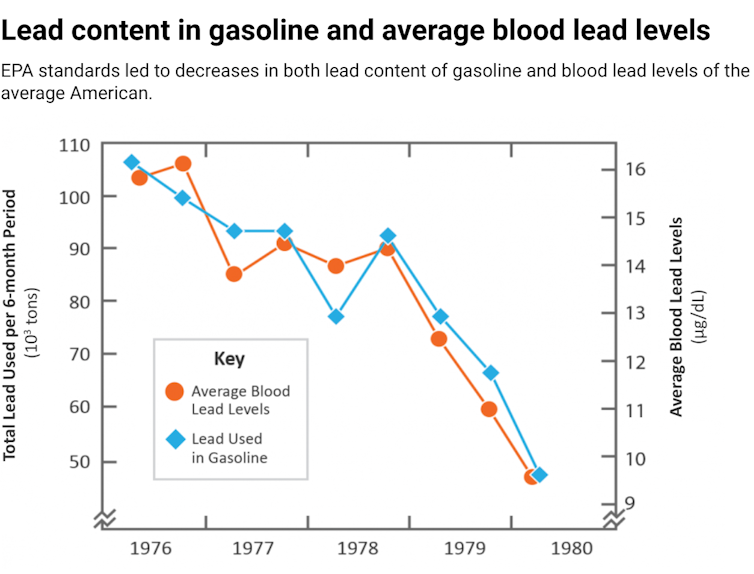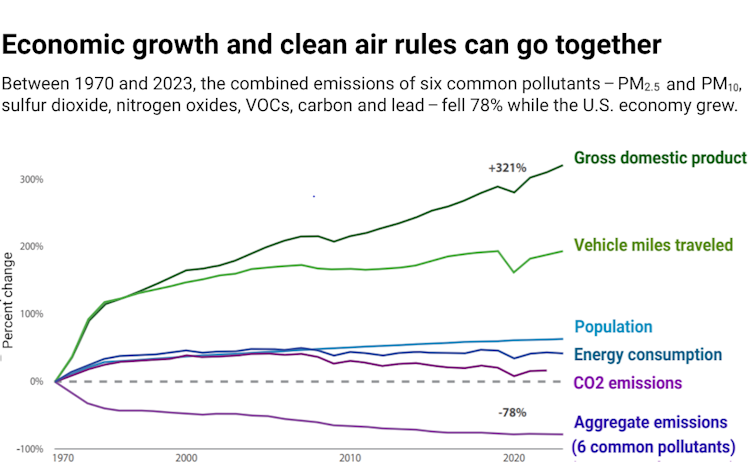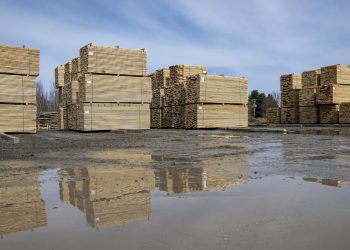
The Trump administration is “reconsidering” more than 30 air pollution regulations, and it offered industries a brief window to apply for exemptions that would allow them to stop following many air quality regulations immediately if approved. All of the exemptions involve rules finalized in 2024 and include regulations for hazardous air pollutants that cause asthma, heart disease and cancer.
The results – if regulations are ultimately rolled back and if those rollbacks and any exemptions stand up to court challenges – could impact air quality across the United States.
“Reconsideration” is a term used to review or modify a government regulation. While Environmental Protection Agency Administrator Lee Zeldin provided few details, the breadth of the regulations being reconsidered affects all Americans. They include rules that set limits for pollutants that can harm human health, such as ozone, particulate matter and volatile organic carbon.
Zeldin wrote on March 12, 2025, that his deregulation moves would “roll back trillions in regulatory costs and hidden “taxes” on U.S. families.“
What Zeldin didn’t say is that the economic and health benefits from decades of federal clean air regulations have far outweighed their costs. Some estimates suggest every $1 spent meeting clean air rules has returned $10 in health and economic benefits.
How far America has come, because of regulations
In the early 1970s, thick smog blanketed American cities and acid rain stripped forests bare from the Northeast to the Midwest.
Air pollution wasn’t just a nuisance – it was a public health emergency. But in the decades since, the United States has engineered one of the most successful environmental turnarounds in history.
Thanks to stronger air quality regulations, pollution levels have plummeted, preventing hundreds of thousands of deaths annually. And despite early predictions that these regulations would cripple the economy, the opposite has proven true: The U.S. economy more than doubled in size while pollution fell, showing that clean air and economic growth can – and do – go hand in hand.
The numbers are eye-popping.
An Environmental Protection Agency analysis of the first 20 years of the Clean Air Act, from 1970 to 1990, found the economic benefits of the regulations were about 42 times greater than the costs.
The EPA later estimated that the cost of air quality regulations in the U.S. would be about US$65 billion in 2020, and the benefits, primarily in improved health and increased worker productivity, would be around $2 trillion. Other studies have found similar benefits.
That’s a return of more than 30 to 1, making clean air one of the best investments the country has ever made.
Science-based regulations even the playing field
The turning point came with the passage of the Clean Air Act of 1970, which put in place strict rules on pollutants from industry, vehicles and power plants.
These rules targeted key culprits: lead, ozone, sulfur dioxide, nitrogen oxides and particulate matter – substances that contribute to asthma, heart disease and premature deaths. An example was the removal of lead, which can harm the brain and other organs, from gasoline. That single change resulted in far lower levels of lead in people’s blood, including a 70% drop in U.S. children’s blood-lead levels.

USEPA/Environmental Criteria and Assessment Office (1986)
The results have been extraordinary. Since 1980, emissions of six major air pollutants have dropped by 78%, even as the U.S. economy has more than doubled in size. Cities that were once notorious for their thick, choking smog – such as Los Angeles, Houston and Pittsburgh – now see far cleaner air, while lakes and forests devastated by acid rain in the Northeast have rebounded.

EPA
And most importantly, lives have been saved. The Clean Air Act requires the EPA to periodically estimate the costs and benefits of air quality regulations. In the most recent estimate, released in 2011, the EPA projected that air quality improvements would prevent over 230,000 premature deaths in 2020. That means fewer heart attacks, fewer emergency room visits for asthma, and more years of healthy life for millions of Americans.
The economic payoff
Critics of air quality regulations have long argued that the regulations are too expensive for businesses and consumers. But the data tells a very different story.
EPA studies have confirmed that clean air regulations improve air quality over time. Other studies have shown that the health benefits greatly outweigh the costs. That pays off for the economy. Fewer illnesses mean lower health care costs, and healthier workers mean higher productivity and fewer missed workdays.
The EPA estimated that for every $1 spent on meeting air quality regulations, the United States received $9 in benefits. A separate study by the non-partisan National Bureau of Economic Research in 2024 estimated that each $1 spent on air pollution regulation brought the U.S. economy at least $10 in benefits. And when considering the long-term impact on human health and climate stability, the return is even greater.

Ian Dryden/Los Angeles Times/UCLA Archive/Wikimedia Commons, CC BY
The next chapter in clean air
The air Americans breathe today is cleaner, much healthier and safer than it was just a few decades ago.
Yet, despite this remarkable progress, air pollution remains a challenge in some parts of the country. Some urban neighborhoods remain stubbornly polluted because of vehicle emissions and industrial pollution. While urban pollution has declined, wildfire smoke has become a larger influence on poor air quality across the nation.
That means the EPA still has work to do.
If the agency works with environmental scientists, public health experts and industry, and fosters honest scientific consensus, it can continue to protect public health while supporting economic growth. At the same time, it can ensure that future generations enjoy the same clean air and prosperity that regulations have made possible.
By instead considering retracting clean air rules, the EPA is calling into question the expertise of countless scientists who have provided their objective advice over decades to set standards designed to protect human lives. In many cases, industries won’t want to go back to past polluting ways, but lifting clean air rules means future investment might not be as protective. And it increases future regulatory uncertainty for industries.
The past offers a clear lesson: Investing in clean air is not just good for public health – it’s good for the economy. With a track record of saving lives and delivering trillion-dollar benefits, air quality regulations remain one of the greatest policy success stories in American history.
This article, originally published March 12, 2025, has been updated with the administration’s offer of exemptions for industries.
![]()
Richard E. Peltier receives funding from the US Department of Agriculture and the Rio Grande International Science Center.















